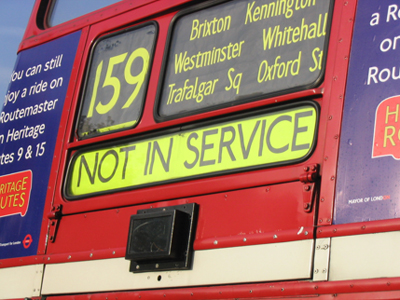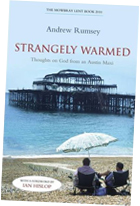| |
|
|
 |
 |
 |
| Aunty nostalgia |
 |
March 2006
Just before Christmas, I bent my joyful footsteps to Brixton Bus Garage for the farewell of London's famed hop-on, hop-off double-decker bus, the Routemaster. Brixton was the terminus for Route 159, the last to run these mythical beasts, and there gathered an odd congregation of enthusiasts, press and confused passengers, together with those like myself, who seem perversely drawn to such swansongs.
It was a singular experience. Flasks of coffee and sandwiches were shared, and each bus that pulled up would be duly applauded and photographed, the driver beaming in his moment of celebrity. Every so often, a bystander would approach the growling bonnet and pat it fondly, as they might a Golden Retriever. As the route list above the driver's cabin was wound on from "Marble Arch" to "Not in Service" there came the unmistakable sound of people quietly deflating.
Each had their own busular memories to relate and I soon realized that, in order to gain access into their twilight circle, I simply had to sidle up and mutter "sad day" or "end of an era" or suchlike phrase to be welcomed as a brother. One such real-time recollection worryingly began in 1939, thus requiring the sort of conversational extraction that is the work of a moment for one schooled in nearly forty years of after-church coffee. As the last Routemaster rattled into the depot and the crowd began to disperse, I paused to overhear one mourner glumly say to his friend, "Well... that's it for London now..."
It strikes me that this doom-laden insecurity about the future is precisely what many people loathe about nostalgic types – that stifling sense that nothing will match up to an imagined and irretrievable past. There is no way forward, only back – except that you can't really go back either. Great.
And yet nostalgia, which we might define as "history after a few drinks", is increasingly a feature of our age. Literally "the longing to return home", it is the natural offspring of what the geographer David Harvey calls "space-time compression", his phrase for the giddy pace of change in Western society. This, he observes, is "exciting, stressful and sometimes deeply troubling", as it whisks away the reassuring handrail of all that is certain and familiar.
Admittedly, this has been going on for years – it was no coincidence, after all, that the romantic poets started to get all dewy-eyed about hedgerows and rustic follies just as they were all being ripped up to build blast furnaces. But in that age, both regress and progress were wedded to a clear spiritual vision of past and future: we were either retreating to Arcadia or advancing to Jerusalem.
But – if you'll allow me – not any more... The current condition is notable for its lack of a destination, be it past or future. With consumer society hurtling forward like a Tesco's trolley down a hill, an equally erratic nostalgia is its inevitable counterpart. This makes it of particular pastoral concern, for, like dotty old dears, we have wandered away from home without remembering where we lived.
With rather more panache, in her compelling study, The Future of Nostalgia, Svetlana Boym puts it like this:
Modern nostalgia is a mourning for the impossibility of a mythical return, for the loss of an enchanted world with clear borders and values... a secular expression of a spiritual longing for an absolute, a home that is both physical and spiritual, the edenic unity of time and space before entry into history. The nostalgic is looking for a spiritual addressee. Encountering silence, he looks for memorable signs, desperately misreading them.
The recovery of a Christian imagination is thus essential, if only to recall where our society used to reside. But nostalgia can fail us here, too. In "Christian Britain", it didn't take much political sleight of hand to reshuffle the hope of heaven into the myth of progress and the Kingdom of God into a sprawling empire.
What Christians believe about the Holy Spirit is rather useful here, for he is understood to be the mysterious way in which we integrate time and eternity. In the New Testament, the Spirit is the one who grafts us into the ancient story of where we came from and where we are heading. In other words, he links us to Jesus Christ, the clue to history.
This is a slippery old business to explain, of course, like most of the things that really matter. Much better to touch and taste it at your local Holy Communion service. Here is where Christians "remember the future" and regain their bearings: where the rootless soul returns home. And where the PA system never works.
In his endearing way, my late father used to call me "aunty nostalgia", no doubt because of my ability to sigh wistfully before I could talk. In the year I was born there was still steam traction on British railways, old money, Lyons Corner Houses. PG Wodehouse was still writing fiction and the Fab Four still recording. Thereafter, such things became inherently more interesting to me for just having ceased to be – which is precisely the nostalgic's conundrum. The very lostness of the past feeds your longing to find it.
But for each of us, the deeper truth is perhaps that we need memories with a future, which lamp up the road ahead and lead us home. Memories which, ultimately, can reckon with death. I'm afraid it's that or the bus. |
|
|
 |
 |
 |
| Strangely Warmed by Andrew Rumsey is now available as a book. |
 |
 |
 |
 |
 |
| Stephen Tomkins' regular column of tales of religious lunacy from the far reaches of the Net |
 |
 |
 |
| Mark Howe's regular rant about Internet culture |
 |
 |
 |
| Also by Stephen Tomkins... a regular round-up of the saints of yore who were one wafer short of a full communion |
| |
|
|
|
|


